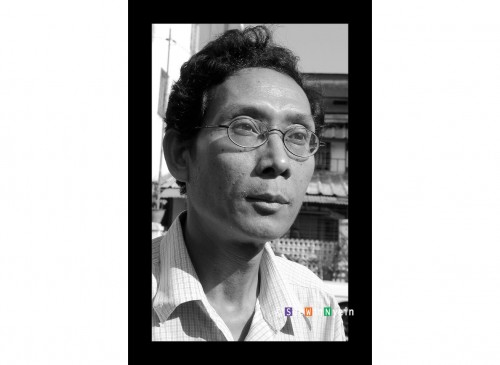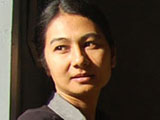Aung Way: A Poet in Exile
by Khet Mar / November 1, 2012 / No comments
After years abroad coming home might be hard for Burmese nationals.

Aung Way. Photo: Soe Win Nyein.
When Burmese readers hear the phrase, “A purple wild horse,” they know it refers to the Burmese poet Aung Way who wrote a poem with the same title. Aung Way is also like a wild horse, and has done much for human rights and democracy in Burma with his headstrong efforts.

- In Burma if you want to hear about issues the newspapers can’t talk about, you should go to a tea shop. Tea houses were where I used to meet with other activists, writers and artists, as well as where I built friendships. Within tea houses we talked about Burmese writers, literary trends we noticed, and, of course, politics. This online space attempts to emulate the conversations I enjoyed in Rangoon’s tea houses.

- Khet Mar is a journalist, novelist, short story writer, poet, and essayist from Burma. She is the author of one novel, Wild Snowy Night, as well as several collections of short stories, essays and poems. Her work has been translated into English and Japanese, been broadcast on radio, and made into a film. She is a former writer-in-residence at City of Asylum/Pittsburgh.
Aung Way was jailed for six years in 1976 after he participated in the Hmaing Centennial Strike commemorating the Burmese nationalist Thakin Kodaw Hmaing. In 1982 Aung Way started writing poetry. When the 1988 uprising happened in Burma, he participated in the protests as a poet under Burma’s Poet Association and the Press Union. When Daw Aung San Suu Kyi founded the National League for Democracy Party (NLD) after the uprising, Aung Way became an organizer for the Irrawaddy Division, but was arrested again in 1989 for participating in the Martyr Day movement.
Then when Daw Aung San Suu Kyi was campaigning in the Irrawaddy Division for the 1990 election Aung Way was arrested once more for having worked for the NLD party in 1988. He was later released in 1991 and resigned from service to the NLD.
Since his release Aung Way has worked as both a poet and an editor, though in 2005 he worked with people recovering from leprosy at Leprosy Rehabilitation Camps. Later he worked with some social organizations and with other poets and writers. From 2006 to 2007 Aung Way and his fellow poets held White Rainbow poetry readings as fundraisers for children with HIV/AIDS in the cities of Yangon and Mandalay.
In 2007, during the Saffron Revolution, the military intelligence searched for Aung Way in hopes of arresting him for aiding the monks who led the revolution. Aung Way decided to leave Burma when he heard that Zaganar, a comedian who was working with him to help the monks, was arrested in late October, 2007. Aung Way recalled his feeling at that time in one of his essays:
“I was running from one place to another in the September rain with a radio. The radio was faithful to me. From one morning to the next, from one midnight to the next, my space was getting narrower and narrower. Run, run, run! I couldn’t hide in the same place twice. I had to abandon everything I owned in my country. I couldn’t hesitate. A poet must take a risk with tough things and less melancholy. I am Forrest Gump. Run, run, run! I will be freed if I can run enough.”
Aung Way arrived at the Thai-Burma border in October, 2007. He was sent to the United States in 2008. The two of us, who both spent years in Burma’s literary world, reunited in America and participated in poetry readings and literature events in the States together.
Aung Way published 19 books of poetry and essays while he was in Burma. Since 2008 he has published two bilingual books of poetry. Aung Way loves his country and expressed this feeling in one of his poems:
“Homesickness must be sharpened regularly
like knifes and iron weapons.
We left our country,
to come back to our country.”
Burmese politics has changed since the new government gained power. Now some of the people who had left Burma since 1988 have the chance to go back home. As soon as he heard that some people could go back, Aung Way called me and said, “I am thinking of going back home, my sister. Our lives are only inside our country.”
I couldn’t respond to his emotional words.
Later he seemed upset when he heard about the problems some people had when they got back home, as particular communities did not welcome them. He opened his heart in a poem, which he wrote in early September, 2012:
“I am not going back home.
I don’t want to take refuge in Yangon
with some idiots
I don’t want to see them.
We, our brothers
would live forever
on the “U Thant” island of New York’s Manhattan river.
When you die,
I will lay a Peacock flag (Burma’s student union flag)
on your body and will burry it.
If I die,
read a poem honoring it for mine.”
Aung Way’s poem, which echoes his broken heart, makes me sad. I am still thinking about the return of a poet who left his country to go back there.




